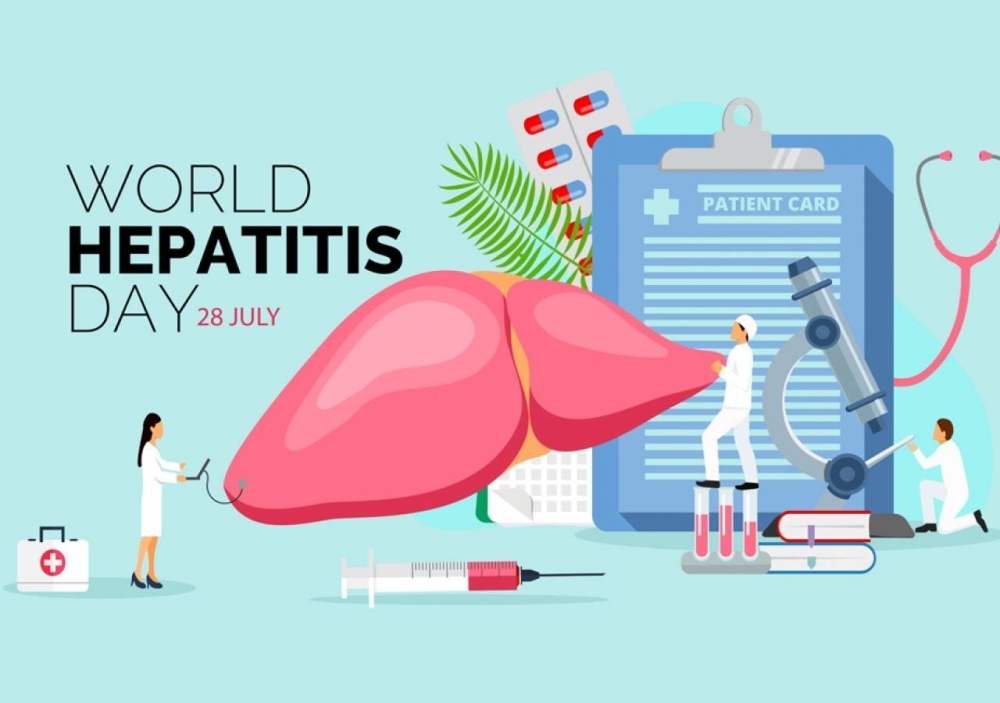July 28th marks World Hepatitis Day, an annual global initiative to raise awareness about hepatitis and its impact on individuals and communities worldwide. Hepatitis is a viral infection that primarily affects the liver, leading to inflammation and, in some cases, severe liver damage. It is often unnoticed until it progresses to advanced stages, making it a silent epidemic. Therefore, this day serves as a critical reminder to educate ourselves and others about this preventable and treatable disease and the steps we can take to safeguard our health.
Understanding Hepatitis:
Hepatitis is a group of viral infections caused by different hepatitis viruses, namely hepatitis A, B, C, D, and E. Each type of hepatitis virus spreads through distinct routes and varies in terms of severity. Of particular concern are hepatitis B and C, which can progress into chronic infections, leading to severe complications like cirrhosis, liver cancer, and even death if left untreated. According to the World Health Organization (WHO), there are approximately 290 million people living with viral hepatitis globally, and unfortunately, many are unaware of their infection. Early detection and proper management are crucial in controlling the spread and impact of these infections.
Tips to prevent Hepatitis.
Preventing hepatitis is possible by implementing straightforward but effective measures. These include:
Vaccination: Vaccination is a highly effective way to prevent hepatitis. Vaccines are available for Hepatitis A and Hepatitis B. The hepatitis A vaccine is recommended for individuals travelling to high-risk areas or those with specific medical conditions. It is essential to remember that while there is no vaccine for hepatitis C, prevention is possible through safe practices, particularly avoiding sharing needles for drug use. Additionally, preventing hepatitis D depends on managing hepatitis B through vaccination and safe practices. The hepatitis B vaccine is advised for infants, children, healthcare workers, sexually active adults, and individuals at high risk of exposure. These vaccines help build immunity against the respective viruses, providing protection from infection.
Practice good hygiene: Hepatitis A and E are primarily transmitted through contaminated food and water. Practising good hygiene is vital in reducing the risk of infection. Always wash your hands thoroughly with soap and water, especially before handling food, using the restroom, and touching potentially contaminated surfaces. Avoid raw or undercooked shellfish and ensure that fruits and vegetables are washed thoroughly before consumption.
Safe sexual practices: Hepatitis B and C can be transmitted through sexual contact with an infected partner. Engaging in safe sex practices can significantly reduce the risk of transmission. Consistently and correctly using condoms during sexual intercourse, especially with new or multiple sexual partners, helps prevent the spread of these viruses.
Avoid sharing personal items: Hepatitis B and C can be transmitted by exchanging infected blood, which can happen when sharing personal items like razors, toothbrushes, and nail clippers. It is essential to use your items and avoid sharing them with others to minimize the risk of transmission.
Practice safe tattooing and body piercing: Choosing a reputable and licensed facility is crucial if you get a tattoo or body piercing. Properly sterilized equipment is essential to reduce the risk of transmission of hepatitis B, and C. Ensure that the artist uses disposable needles and follows strict hygiene protocols to protect against infection.
Get tested: Regular testing is crucial, especially for individuals engaged in high-risk behaviours or those who suspect possible exposure to hepatitis viruses. Early detection of hepatitis infection allows for timely medical intervention, improving treatment outcomes and preventing further transmission. Individuals at higher risk, such as healthcare workers or those with multiple sexual partners, should undergo regular screenings.
Be cautious with medical procedures: Ensuring that all instruments are sterile and correctly disposed of during medical or dental procedures involving needles or other medical equipment is crucial. Healthcare settings should strictly adhere to infection control practices to minimize the risk of transmission of hepatitis viruses from one patient to another.
Preventing hepatitis is achievable through adopting simple yet effective strategies. Vaccination, practising good hygiene, safe sexual practices, and avoiding the sharing of personal items are all vital steps to safeguard oneself from hepatitis A, B, C, D, and E. Regular testing and cautiousness during medical procedures further enhance protection. By taking these preventative measures, individuals can significantly reduce their risk of contracting hepatitis and maintain a healthy liver and overall well-being. Always consult healthcare professionals to assess your risk factors and develop a personalized prevention plan.
* Dr Joby Augustine is a Specialist in Department of Gastroenterology at Aster Hospital, Old Airport Road, Doha (Qatar)



